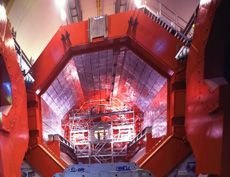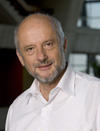|
Tue., July 24
12:00 p.m.
Summer Lecture Series - One West
Speaker: H. Prosper, Florida State University
Title: The Standard Model and Beyond
2:00 p.m.
Research Techniques Seminar - West Wing, WH-10NW
Speaker: N. Otte, Max-Planck-Institut für Physik / Humboldt Universität Berlin
Title: The Geiger-APD: A Novel Photon Detector and Its Application
in Astrophysics Experiments and Positron Emission Tomography
3:30 p.m.
DIRECTOR'S COFFEE BREAK - 2nd Flr X-Over
THERE WILL BE NO ACCELERATOR PHYSICS AND TECHNOLOGY
SEMINAR TODAY
Wed., July 25
8:00 a.m. - 5:00 p.m.
Toward the ILC: A Fermilab Community School on R&D Challenges and Opportunities
THERE WILL BE NO FERMILAB ILC R&D MEETING THIS WEEK
3:30 p.m.
DIRECTOR'S COFFEE BREAK - 2nd Flr X-Over
THERE WILL BE NO FERMILAB COLLOQUIUM THIS WEEK
4:00 p.m.
Fermilab Colloquium - One West
Speaker: M. Ross, Fermilab
Title: Challenges of the ILC Main Linac
Click here for NALCAL,
a weekly calendar with links to additional information. |
Tuesday, July 24
- Golden broccoli & cheese
- Cheesy greek squeeze
- Coconut crusted tilapia
- Spaghetti w/meatballs
- *Toasted almond chicken salad on croissant
- Assorted pizza slices
- Chicken fajitas
*Carb Restricted Alternative
Wilson Hall Cafe Menu |
|
Wednesday, July 25
Lunch
- Salad of ham, gruyere &
cabbage in roquefort dressing
- Chocolate mousse w/almonds & cookies
Thursday, July 26
Dinner
- Pasta w/roasted summer vegetables
- Veal saltimbocca
- Sautéed spinach w/lemon & pine nuts
- Peach melba
Chez Leon Menu
Call x4598 to make your reservation. |
|
|
LHC's ALICE to view early universe composition

The ALICE L3 magnet. Image courtesy of photographer Antonio Saba.
Meet ALICE -- the LHC experiment dedicated to understanding the composition of matter that existed shortly after the Big Bang. In its early moments, the universe existed at such high temperatures that protons had not yet formed and the universe was a hot gas of freely-moving quarks and gluons. ALICE will allow scientists to briefly look back in time by recreating -- on a small scale -- the quark-gluon plasma that existed in a 10-microsecond-old universe.
To understand the behavior and properties of the early universe, scientists will depend on ALICE's high-precision tracking and particle identification detectors to record the results of as many as 50,000 collisions per second. Unique to the ALICE experiment are collisions of lead nuclei, which produce higher densities of hot matter than proton-proton collisions. The result of these collisions will be tiny samples of quark-gluon plasma.
"The results from ALICE will contribute to our understanding of basic quantum chromodynamics and will provide experimental evidence and tests of QCD at high energy densities," said John Harris, ALICE-USA collaboration spokesperson. "This [state of matter] is not part of our everyday existence. Theoretical calculations predict that under such conditions at very high temperatures matter as we know it melts and a deconfined state of quarks and gluons is formed."
Studying matter at high energy densities has been progressing for years at accelerators such as the Relativistic Heavy Ion Collider at Brookhaven. ALICE will be on the cutting edge of research in this field as the dedicated heavy-ion experiment at the LHC, the most powerful accelerator in the world.
-- Lauren Younis
|
|
Elections for the 2007-2008 UEC begin today. The ballot is located here.
Fermilab users must cast their votes by July 30. Please take a few moments to vote for your representatives.
We are fortunate to have 10 individuals who have agreed to stand.
The UEC consists of 12 people elected to two-year terms. We elect 6
people to begin each September, replacing those whose terms have ended.
Many thanks are due to Brendan Casey, Max Chertok, Tom Diehl, George
Gollin, Wyatt Merrit and Breese Quinn, who are completing their terms and
have given so much to the Fermilab Community.
-- Sacha Kopp, chair, UEC
|
From New York Times,
July 24, 2007
At Fermilab, the Race Is on for the 'God Particle'
In 1977, Steven Weinberg, then two years shy of the Nobel Prize in Physics, decided to do a little of what some theorists call "ambulance chasing."
He heard a rumor, while spending a year at Stanford, that collisions at the Fermi National Accelerator Laboratory were spitting out weird triplets of particles known as muons, which are sort of fat electrons. Dr. Weinberg canceled reservations at a lodge in Yosemite National Park to spend the weekend with his colleague Benjamin Lee, trying to concoct a theory to explain the trimuons.
But the only theory he and Dr. Lee could come up with was ugly. A few weeks later it turned out that the triplet effect wasn't true.
"I've always been embarrassed that we managed to come up with a theory," Dr. Weinberg, now at the University of Texas at Austin, said recently.
Dr. Weinberg said that 30 years later, he still has not gotten to Yosemite.
"And we never got trimuons either," he added.
And therein lies a lesson - or not - for the world's physicists.
Earlier this summer, the physics world was jolted by a rumor that a team of scientists from the Fermi National Accelerator Laboratory, or Fermilab, in Batavia, Ill., had found a bump in their data that might be a legendary particle that has haunted physicists for a generation. It is known colloquially as the Higgs boson and sometimes grandly as the "God particle." According to the Standard Model that has ruled physics for 30 years, the Higgs endows elementary particles in the universe with mass.
Read more
|
|
|
Diversity Council
 |
| Pier Oddone |
Fermilab shares a goal with all modern organizations in our country: an environment that welcomes diversity and reflects it in the composition of the staff. For us, making Fermilab attractive to a diverse population enhances Fermilab for the benefit of all. It also gives us a competitive advantage in recruitment and retention of employees. To accomplish this goal takes the commitment not only of management but the commitment and the involvement of all members of the staff.
In order to augment our efforts in this area, I have established the Diversity Council. It is different from the diversity councils that I am familiar with at other institutions in both its scope and organization. It has an ambitious and comprehensive scope that includes the development and implementation of strategic programs in three areas: 1) recruitment, retention and development of our staff, 2) helping to build a more diverse future workforce through educational programs (commonly referred to as the "workforce pipeline") and 3) enhancing the involvement with our local community.
In each of these three areas the Council will have several subcommittees focused on specific programs or portions of the laboratory. Each subcommittee will develop strategies and goals and help in the implementation of initiatives, each in fairly narrow aspects of the program. The large number of subcommittees serves two purposes. The first is to narrow the scope of a single group so something is accomplished in each of the areas. The second is to provide a vehicle to broaden the direct and active participation of our staff in these enhancement activities. Collectively this effort should have a broad impact by increasing the depth of participation across Fermilab and hence drive the broad awareness that necessarily accompanies the building of a diverse institution. Strong and knowledgeable leadership will be required by the chair of the Council to keep the activities of the various groups focused, consistent with each other and productive. The Diversity Council will report directly to me through its first chair Dianne Engram.
Given the large scope of the Council, we will implement the various subcommittees in two phases, learning as we go along. This is after all a new and experimental approach. I ask for your support in this effort to make Fermilab a model institution also in this area. There is much work to do!
|
|
Meeting Maker Upgrade
Meeting Maker will be upgraded to the latest version on July 25. The service will be down from 5:00 a.m. to 7:00 a.m. Users of the system are instructed to leave their machines on Wednesday night.
Contribute your music
to labwide party
In keeping with the international flavor of the labwide party on Friday, August 3, the party organizers and the DJ invite you to contribute CDs with up to three tracks of your favorite party music from your home country for play during the party. Please label the CDs with your name, mail station and e-mail address and bring them to Judy Treend, Office of Public Affairs, WH1NE, by 5 p.m. on Monday, July 30.
Salary Review Process Location Change
General information for all employees on updates to the salary review process is now available online. Please review this presentation. If you have any questions on the information provided or any topic related to the upcoming salary review, please attend one of the town-hall meetings scheduled for 1:30 p.m. on July 25, 26, and 31 in Wilson Hall, Auditorium.
MS Project 2003 class August 1 and 2
Learn to create and modify a project plan file that contains tasks,
resources, and resource assignments in an MS Project Class. Additional classes have been scheduled for August 1 and 2. Learn more and enroll
Midsummer Theatre Troupe
Shakespeare in the Park
If you're looking for something to do this weekend, head out to see Bruce Worthel of the Accelerator Division play Egeus in Shakespeare's "Midsummer Night's Dream." Batavia's Clark Island is still off limits due to construction, but you can see the play for free at these locations:
Tuesday 7/24/07 - Aurora, Payton's Roundhouse - 7 p.m.
Tuesday 7/31/07 - Aurora, Payton's Roundhouse - 7 p.m.
Saturday 8/4/07 - Aurora, Phillips Park - 7 p.m.
Additional Activities |
|